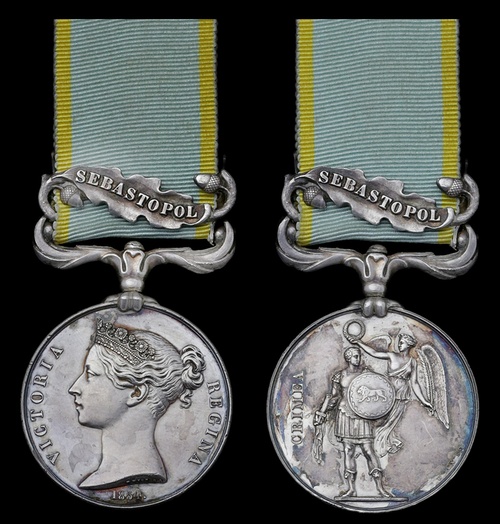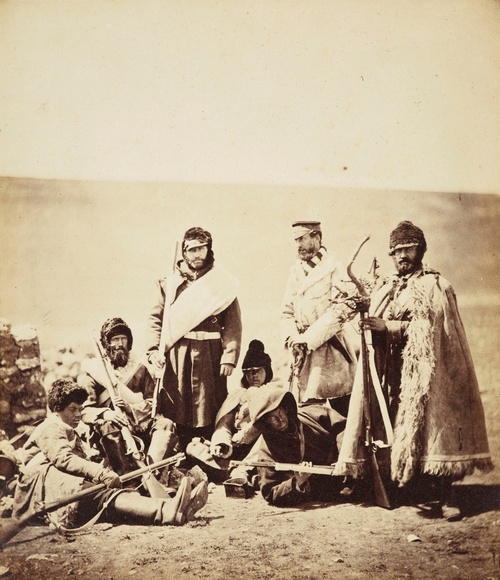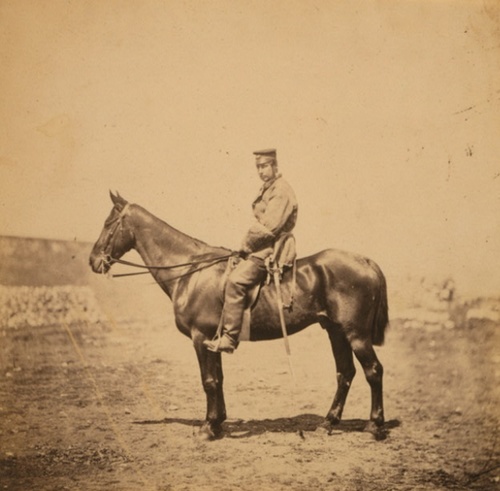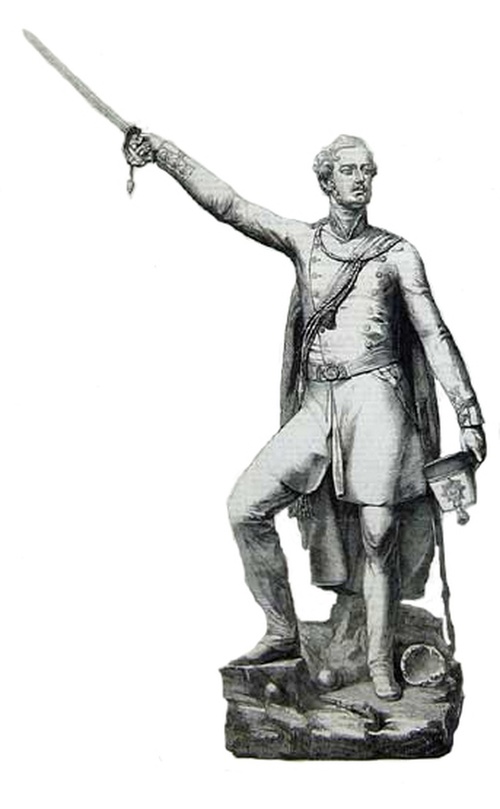Auction: 19003 - Orders, Decorations and Medals
Lot: 6
'Your gallant and heroic son was killed in the execution of his duty on the evening of the 3rd [September]. He was posting some sentries in front of a trench we were making at right angles with the 6th parallel, and consequently close to the enemy, when the Russians from behind the stone walls for which our sentries were making, fired one direful volley, and the whole English party fell dead. In the whole course of a long service I never knew an officer so deeply and universally regretted; he was beloved by the officers and the idol of his men. He is an irreparable loss to the 77th Regiment.'
Lieutenant-Colonel Stratton, Officer Commanding 77th Foot, pays tribute to Captain Pechell
The deeply emotive Crimea Medal awarded to Captain W. H. C. G. Pechell, 77th Foot; the only son of a prominent Whig statesman, Pechell volunteered to lead his men in a daring attempt to seize Russian entrenchments outside the Redan on 3 September 1855
Three months earlier Prince Albert, concerned by Pechell's disregard for his own safety, offered him a commission in the Guards to bring him home to England. Pechell's sense of duty and loyalty to his regiment would never permit this, so he went bravely to his death before the walls of Sebastopol and was posthumously mentioned in dispatches
Pechell was the last scion of an important military family with longstanding royal connections; his death caused an outpouring of public grief, particularly in his home town of Brighton, where the fashionable sculptor Matthew Noble carved an over-life-size statue of the young Captain at the moment of his demise. This statue, one of Noble's masterpieces, has an emotive story in itself
Crimea 1854-56, 1 clasp, Sebastopol (Captn. W. H. C. G. Pechell. 77th Foot.), officially impressed naming, nearly extremely fine
M.I.D. London Gazette 19 September 1855.
William Henry Cecil George Pechell was born at Castle Goring on 26 May 1830, the only son of Vice-Admiral Sir George Brooke Pechell, 4th Baronet, and Lady Katherine Annabella Pechel. Sir George was Whig M.P. for Brighton for over 25 years, and young William spent most of his short life at the seaside town. His family (originally de Péchels) had been minor Huguenot nobility in Languedoc. His great-great-grandfather fled to Ireland following the Revocation of the Edict of Nantes. Each subsequent generation proved its loyalty to the British crown: William's great-grandfather was wounded at Lauffeld during the War of Austrian Succession, receiving a 'high commendation' from the Duke of Cumberland, while his grandfather was appointed Gentleman Usher to the Queen in 1787, holding this post right up to her death in 1818. His uncle, another Whig politician, was a decorated Rear-Admiral. William Pechell was no doubt inspired by his family's military record when he was commissioned as an Ensign into the 77th (East Middlesex) Regiment on 1 August 1848. He advanced to Lieutenant on 25 July 1851, and Captain on 13 May 1853.
The 77th Foot sailed for Malta in March 1854, aboard the steam vessel Prince. Part of Sir George Brown's Light Division, the regiment formed the left flank of the assault on the Great Redoubt during the Battle of Alma. It saw action at Inkermann, before settling into the Siege of Sebastopol. Pechell appears in three photographs by Roger Fenton (illustrated). Two of these are 77th Foot group photographs, showing the men in winter dress. These are held in The National Army Museum (NAM. 1964-12-151-6-28) and The Royal Collection (RCIN 2500453). The third photograph, held by The Library of Congress (2002695372), shows Pechell mounted on his horse.
On 18 June 1855, the 40th Anniversary of Waterloo, the 77th took part in the First Assault on the Redan. The British attack was repulsed with heavy loss, particularly among the officers. Pechell wrote numerous letters home, recording the progress of the war in minute detail. His last letter to his father was sent on 1 September 1855, three days before his death. Years later, his sisters Henrietta and Adelaide compiled his letters into a comprehensive diary of his service in the Crimea. The entry for 30 August 1855 reads:
'For the trenches this evening, four Captains, four Subalterns, twenty Sergeants, and five hundred and five rank and file. Fifty men of the above party, were sent forward, under Captain Pechell, to a coteau [glacis], which was being constructed at right angles to the sixth parallel, under the proper left face of the Redan, about two hundred Russians made a sortie, to drive the workmen away from the coteau. They had nearly succeeded in the attempt, when Captain Pechell, at the head of his party, charged them, with the bayonet, and, after an obstinate contest, he defeated them, and recovered some gabions which they had taken.
The Russians were handled so roughly, in this encounter, that they did not return during the night, and Captain Pechell held the coteau, under a severe fire, till morning, when he was relieved by a party of the 91st Regiment. This was considered such a gallant feat of arms, that Captain Pechell was honourably mentioned, by the Commander-in-Chief, in his dispatches, for his conduct on the occasion, and, no doubt, he would have been promoted to the rank of Brevet Major had he lived, but, most unfortunately for the Regiment, and the service, he was killed, on the very same spot four nights after.'
The entry for 3 September continues:
'The General in command was very anxious to have sentries posted in advance of the coyeau, which Captain Pechell had defended so gallantly a few nights before. Captain Pechell immediately volunteered that duty, and his services were accepted. He went out with a Sergeant and four double Sentries, hoping to gain the shelter of an old wall, for his men, before the enemy occupied it for the night, but the Russians were there before him, and, as the English party approached, they fired one volley, which killed Captain Pechell, Sergeant John Laughlin, Private William Sharp, Private George Williams and wounded three others.'
This account is corroborated by the letter written by Pechell's commanding officer, Lieutenant-Colonel Stratton, dated 7 September 1855 (see above). Stratton sent this letter to Pechell's heartbroken father back in Brighton, where news of the gallant death of the scion of this esteemed family was spreading like wildfire. Pechell's death was announced in The London Gazette on 18 September, and he received a posthumous mention in General Simpson's dispatch. William Pechell was loved by his men and revered among brother officers. The day after his death General Sir William Codrington penned the following letter to his father:
'Before Sebastopol, September 4th 1855.
Dear Sir George -
It is sad news for you, and for us, that was brought up from the trenches last night; for your gallant son has paid the penalty of war, and fallen honourably in difficult and dangerous service. You will have heard from those who were more intimate with him, how sincerely all were attached to him in his regiment, how all regret his loss, and that he was not spared to help us possibly in more important work than that in which he unfortunately was lost.
Small walls and quarries and rough ground in front of a new sap considered important prevented its easily being carried, and it was necessary to occupy that shelter before the Russians got there at dusk, in order that we might have the advantage of the cover against them, instead of their firing from it upon us. Major-General Straubenzee would not accept your son's volunteering to do this in the early part of the day, as it was to have been carried out from a different part of the work, but finding it had not been occupied, from some mistake, he then sent up your son, whose knowledge of the ground was good, and whose conduct had been, a few nights before, conspicuously good at the same service. He took out with him a sergeant and eight men, supported by a sergeant and twelve others, but before getting possession of the walls and rough ground, received a volley from the Russians who were hid there, one of which balls passed through his heart giving him, alas, instantaneous, but painless death. His body was brought in and will be buried tomorrow morning, in the same spot where lie many of his regiment, and his gallant Colonel, Egerton, amongst them.
But this loss of familiar names of the good and gallant blood of English gentlemen is most painful, however much it is redeemed in your son by the knowledge of his constant energy and attention, his devotion to the service, which made him volunteer for a duty both difficult and dangerous, in the hope of adding to the fair credit he had gained for similar assistance to others a few nights before.'
Pechell was buried alongside his fallen comrades in the mud before Sebastopol, his body lowered into the ground '… amidst the din and thunder of countless guns' (Brighton Herald, 29 September 1855). One soldier attending the burial wrote: 'The incessant and awful din of that terrible bombardment at a spot within range of the enemy's batteries did not prevent us from joining heartily in the service which was read over his body.' Pechell's death was made all the more bitter by the revelation that in June 1855 he refused an opportunity to return to England, an offer made to him personally by Prince Albert. The Brighton Herald of Saturday 15 September reported:
'After the attack on the Redan on 18th June, a gracious offer was made by Prince Albert to place him in His Royal Highness's Regiment of Guards, which would have been the means of expediting his return to England; but the high position he held in his Regiment and the zeal which stimulated him in the conscientious discharge of his duties would not allow him at such a moment to quit the post of honour and of danger to which he had so nobly devoted himself; he therefore requested permission to remain in the 77th, and he had the satisfaction of being informed that his decision was fully approved and appreciated by His Royal Highness.'
Pechell chose to remain at his post, performing his duty to the end. His body was eventually brought home in a lead coffin and interred at St. Margaret's Church, Angmering. On Monday 24 September, a packed meeting was held in Brighton to decide on a suitable memorial to commemorate this local hero. The proposal was submitted by William Peel and seconded by William Catt. Several speeches followed, and a public fund was set up (Brighton Herald, 29 September 1855). 1,130 residents of Brighton contributed, and within three months enough money was raised for a 10-foot high statue of Pechell, in Caen stone, to be carved by the acclaimed sculptor Matthew Noble (c. 1817-76). The statue showed Pechell, sword in hand, urging his troops forward just moments before he fell. The Brighton Herald said excitedly: 'Brighton will be proud of this statue.' It was unveiled at a public ceremony on 19 February 1859. It was displayed in the vestibule of the Royal Pavilion, a space which it dominated (see illustration). Its plinth bore the inscription: 'WILLIAM HENRY CECIL GEORGE PECHELL - KILLED BEFORE SEBASTOPOL SEPTEMBER 3 1855 IN THE NOBLE PERFORMANCE OF HIS DUTY WHILE LEADING HIS MEN IN FRONT OF THE ADVANCED TRENCH NEAR THE REDAN AGED 25 YEARS - ERECTED BY PUBLIC SUBSCRIPTION'.
In 1914 this magnificent statue was moved to the entrance hall of Brighton Museum and Art Gallery, and in 1930 it was placed at the gallery's southern end. The museum's trustees then exposed the statue to the elements. In 1940 they moved it to a corner of Stanmer Park, without its plinth (now lost). For years the statue eroded in the wilderness. Plans to give it to the Middlesex Regiment Museum fell through, owing to the problems of transporting such a heavy object. Vandals rudely defaced it, breaking off Pechell's head. His shako now lies discarded on the ground, his left arm severed at the elbow. Moss now covers his face and uniform, of which every detail has been worn away. This disgraceful state of affairs is revealed in the photograph opposite, taken in 2007. The statue now stands in Waterloo Street, Brighton.
Pechell is commemorated by a wall tablet bearing his family arms in the North Chancel of St. Margaret's Church, Angmering, West Sussex.
Sold with copied research, including pages from the diary of Pechell's service compiled by his sisters after his death, and reproductions of Roger Fenton's photographs.
Subject to 20% VAT on Buyer’s Premium. For more information please view Terms and Conditions for Buyers.
Estimate
£2,400 to £2,800
Starting price
£1600











